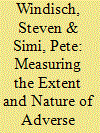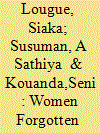| Srl | Item |
| 1 |
ID:
140000


|
|
|
|
|
| Summary/Abstract |
Terrorism is a complex issue and various researchers have identified numerous causes and conditions that generate or are capable of generating terrorism. In the last decade, terrorist attacks claimed 36,495 lives and injured 27,985 people in Pakistan as a result of 3,482 bomb blasts and 281 suicide attacks. The aim of this research was to establish the major risk factors generating terrorism, based on the opinions of security officials who dealt directly with the Pakistan security situation. Sixty-five causes identified from the literature and interviews with security officials were modeled and transformed into a questionnaire. A nationwide response from security officials who were directly involved in dealing with apprehended terrorists was obtained. The population was selected proportionately from high, medium, and low security zones of Pakistan. Out of 500 questionnaires sent, 103 valid responses were received. The results helped establish the 13 major risk factors associated with generating terrorism. It was observed that addressing these 13 major risk factors would mostly resolve the other minor risk factors as well. Findings of this research might be beneficial for countries affected by terrorism, and countries with prioritized and rationalized allocation of funds in their budgets for substantially overcoming terrorism.
|
|
|
|
|
|
|
|
|
|
|
|
|
|
|
|
| 2 |
ID:
188074


|
|
|
|
|
| Summary/Abstract |
While progress has been made to understand mid-life correlates associated with extremist participation, much less research focuses on adolescent risk factors. The purpose of the current study is to expand upon the focus on individual-level correlates by assessing the extent and nature of childhood adversity among a sample of former white supremacists. The current study relies on in-depth life-history interviews with ninety-one North America-based former white supremacists and the Adverse Childhood Experiences questionnaire. Overall, the current sample contained elevated rates of childhood risk factors with 63 percent of participants having experienced four or more adverse experiences during the first eighteen years of their lives (as compared to 55 percent of a comparison “high risk” sample and 16 percent of the U.S. general population sample). Furthermore, participants discussed a variety of maladaptive coping strategies associated with adversity that generated vulnerabilities to adolescent misconduct and extremism early in the life-course. Our findings indicate that extremist onset does not begin with a single life event but rather is generated, and further exacerbated by the cumulative impact of multiple adverse experiences during childhood.
|
|
|
|
|
|
|
|
|
|
|
|
|
|
|
|
| 3 |
ID:
104239


|
|
|
|
|
| Publication |
2011.
|
| Summary/Abstract |
Determination of the prevalence of primary and secondary risk factors of non-communicable diseases among Mongolian adults aged 55-64 years is essential for the mid-term evaluation of the implementation status of the National program on prevention and control of non-communicable diseases.
|
|
|
|
|
|
|
|
|
|
|
|
|
|
|
|
| 4 |
ID:
161842


|
|
|
|
|
| Summary/Abstract |
The rise of non-communicable diseases has placed enormous stress on health systems leading to calls for improved prevention. This article examines the association of risk factors and non-communicable disease diagnosis in China using longitudinal data which enables us to control for important simultaneity bias. Using three waves of the China Family Panel Studies (CFPS) survey (2010–2014) and a dynamic model conditional on not having an NCD in the first period, we find positive association of being obese, using solid cooking fuels, history of frequent drinking, and household consumption expenditure during the preceding period on non-communicable disease onset. We find significant heterogeneity in risks across the population suggesting that a targeted policy response is required to reduce the burden of non-communicable disease in China.
|
|
|
|
|
|
|
|
|
|
|
|
|
|
|
|
| 5 |
ID:
142509


|
|
|
|
|
| Summary/Abstract |
The aim of this paper is to determine and compare the risk factors of maternal mortality before and after childbirth in Burkina Faso. Analyses are performed at both bivariate and multivariate level using conditional logistic regression. An Emergency Obstetric Care (EMOC) survey of Burkina Faso for 2010 provided the data utilized for the analyses. The diagnosis of health professionals indicated that abortion with 36.3% is the main direct cause of prenatal maternal deaths while haemorrhage with 41.6% is the main direct cause of maternal mortality after delivery. In addition, 29.4% of post-natal maternal deaths were due to infection while only 23.5% of prenatal maternal deaths were due to the same cause.
|
|
|
|
|
|
|
|
|
|
|
|
|
|
|
|